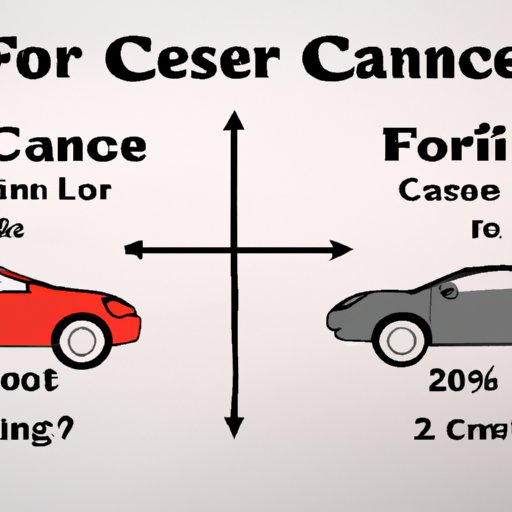Introduction
Financing a car is a big decision that requires careful consideration. When you finance a car, you are taking out a loan from a lender in order to purchase the vehicle. The loan is typically paid back over a set period of time with interest. There are a number of factors to consider when deciding how long to finance a car, including your ability to make payments, the length of loan, and the interest rate.

Analyzing the Pros and Cons of Financing a Car for Different Time Periods
When it comes to financing a car, there are generally three different time frames you can choose from: short-term, medium-term, and long-term. Each of these has its own advantages and disadvantages that should be taken into account before making a decision.
Short-Term Financing
Short-term financing is usually defined as a loan with a repayment period of one to five years. One of the main benefits of short-term financing is that it often comes with a lower interest rate than a longer loan. This can result in significant savings over the life of the loan. In addition, short-term financing may also be easier to qualify for since the loan amount is smaller and the repayment period is shorter.
However, there are some drawbacks to short-term financing as well. The monthly payments may be higher since you are paying off the loan more quickly. Additionally, if you need additional funds in the future, such as for repairs or upgrades, you may have to take out another loan since the first one will already be paid off.
Medium-Term Financing
Medium-term financing is typically defined as a loan with a repayment period of six to seven years. One of the main advantages of medium-term financing is that the monthly payments are usually lower than those of a shorter loan. This can make it easier to manage your budget and stay on top of your payments.
The downside to medium-term financing is that it often comes with a higher interest rate than a shorter loan. This means that you may end up paying more in interest over the life of the loan. Additionally, if you need to refinance the loan at any point, you may be subject to a prepayment penalty.
Long-Term Financing
Long-term financing is usually defined as a loan with a repayment period of eight years or more. The biggest benefit of this type of financing is that the monthly payments are usually much lower than those of a shorter loan. This can make it easier to manage your budget and stay on top of your payments.
However, there are some drawbacks to long-term financing as well. The interest rate is usually higher than that of a shorter loan, which means you may end up paying more in interest over the life of the loan. Additionally, if you need to refinance the loan at any point, you may be subject to a prepayment penalty.

How to Calculate Your Budget for Financing a Car
Before you decide how long to finance a car, it’s important to understand what your budget looks like. To do this, you should estimate your monthly payment, understand your credit score, and calculate the total cost of financing.
Estimating Your Monthly Payment
The first step in calculating your budget for financing a car is to estimate your monthly payment. To do this, you’ll need to know the loan amount, the interest rate, and the term of the loan. You can use an online calculator to help you determine your estimated payment.
Understanding Your Credit Score
Your credit score plays a major role in determining the interest rate you’ll receive on your loan. Generally, the higher your credit score, the lower the interest rate you’ll qualify for. It’s important to check your credit score before applying for a loan so that you know what to expect.
Calculating the Total Cost of Financing
Once you’ve estimated your monthly payment and understood your credit score, you can calculate the total cost of financing. This includes the loan amount, interest rate, and term of the loan. By understanding the total cost of financing, you can make an informed decision about how long to finance a car.
Factors to Consider When Deciding How Long to Finance a Car
In addition to calculating your budget for financing a car, there are a few other factors to consider when deciding how long to finance a car. These include your ability to make payments, the length of loan, and the interest rate.
Ability to Make Payments
One of the most important factors to consider when deciding how long to finance a car is your ability to make payments. If you can only afford a small monthly payment, then you may want to opt for a shorter loan in order to keep your payments manageable. On the other hand, if you have the financial flexibility to make larger payments, then you may want to choose a longer loan in order to get a lower interest rate.
Length of Loan
Another factor to consider when deciding how long to finance a car is the length of the loan. A shorter loan typically comes with a higher interest rate, but it will be paid off more quickly. A longer loan usually has a lower interest rate, but it will take longer to pay off.
Interest Rate
The interest rate is another important factor to consider when deciding how long to finance a car. A lower interest rate will save you money over the life of the loan, so it’s important to shop around for the best rate available.
Understanding Interest Rates and Their Impact on Financing a Car
When shopping for a loan to finance a car, it’s important to understand the differences between fixed and variable interest rates. Fixed interest rates remain the same throughout the life of the loan, while variable interest rates can change over time. It’s important to understand how interest rates are determined and their impact on financing a car.
Fixed vs Variable Interest Rates
Fixed interest rates remain the same throughout the life of the loan, while variable interest rates can fluctuate based on market conditions. Fixed interest rates are typically more stable and predictable, while variable interest rates may offer the potential for lower rates over the life of the loan.
How Interest Rates are Determined
Interest rates are determined by a variety of factors, including the borrower’s credit score, the loan amount, and the length of the loan. Generally, the higher the credit score, the lower the interest rate. Additionally, the loan amount and length of loan can also affect the interest rate.
Impact of Interest Rates on Financing
The interest rate you receive on your loan will have a direct impact on the total cost of financing. Generally, the lower the interest rate, the less you’ll pay over the life of the loan. It’s important to shop around for the best rate available in order to get the lowest total cost of financing.

Comparing Different Loan Options for Financing a Car
When financing a car, there are several different loan options available. These include bank loans, credit unions, and auto dealerships. Each option has its own advantages and disadvantages, so it’s important to compare them before making a decision.
Bank Loans
Bank loans are typically offered through traditional banks and online lenders. They usually come with competitive interest rates and flexible repayment terms. However, they may require a good credit score in order to qualify.
Credit Unions
Credit unions are nonprofit organizations that offer a variety of financial services, including auto loans. They usually have lower interest rates and more flexible repayment terms than banks. However, they may require membership in order to qualify.
Auto Dealerships
Auto dealerships typically offer financing through their own lenders. They usually have competitive interest rates and flexible repayment terms. However, they may require a good credit score in order to qualify.
Conclusion
Deciding how long to finance a car is a big decision that requires careful consideration. It’s important to understand your budget, consider your ability to make payments, understand the length of loan, and compare different loan options. Additionally, it’s essential to understand the differences between fixed and variable interest rates and how they impact the total cost of financing. By taking all of these factors into account, you can make an informed decision about how long to finance a car.
(Note: Is this article not meeting your expectations? Do you have knowledge or insights to share? Unlock new opportunities and expand your reach by joining our authors team. Click Registration to join us and share your expertise with our readers.)
